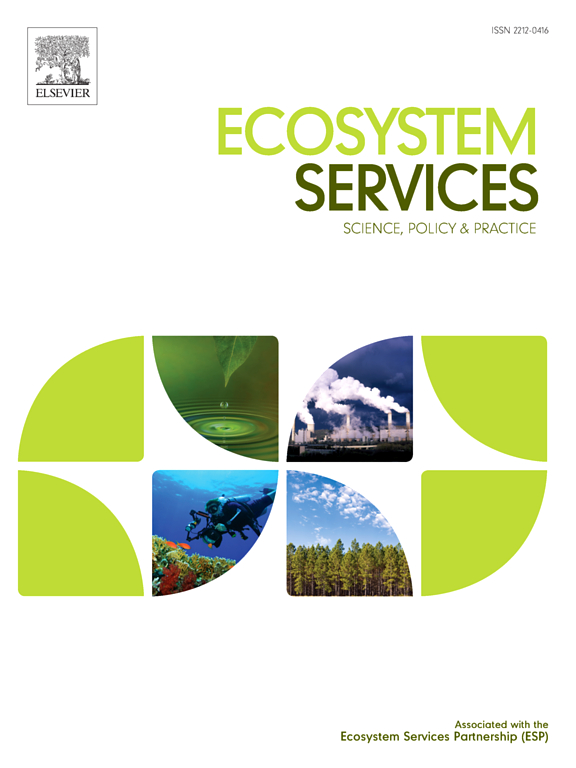构建司法与生态系统服务之间的关系:系统回顾
IF 6.6
2区 环境科学与生态学
Q1 ECOLOGY
引用次数: 0
摘要
生态系统服务是环境正义不可或缺的组成部分,特别是因为它们对不同社区福祉的贡献并不均衡。有效的生态系统管理和治理可以促进公平获取,确保边缘化群体不被排除在生态系统福利之外,同时承认多个利益攸关方的利益,促进公平决策。虽然环境正义是一个多方面的概念,包括分配、程序和认可维度,但大多数关于环境正义的研究主要集中在分配方面。最近的评论表明,人们对将环境正义问题与环境科学相结合的兴趣日益浓厚,但也突出了在理解如何在不同背景下构建和研究环境正义与环境科学之间的关系方面的差距。我们对科学文献进行了系统的回顾,以确定ES与正义之间关系的主要框架。通过对217篇文章的定性和定量分析,从环境正义的角度进行了检查,我们确定了五个不同的框架,即ES与正义之间关系的特定概念,这些概念最终影响了正义的可见或不可见。“空间”、“获取”、“价值”、“PES”和“管理”的每一个框架都与社会经济体系的具体研究问题和方法,以及关于正义的具体观点和发现有关。本次审查中确定的多种框架强调了环境正义概念的复杂性,并强调了在解决与环境正义有关的正义问题时参与不同观点的重要性。本文章由计算机程序翻译,如有差异,请以英文原文为准。
Framing the relationship between justice and ecosystem services: A systematic review
Ecosystem services (ES) are integral to environmental justice, in particular because they unevenly contribute to the well-being of different communities. Effective ES management and governance can promote equitable access and ensure that marginalized groups are not excluded from ES benefits, while recognizing the interests of multiple stakeholders and fostering fair decision making. Although environmental justice is a multifaceted concept that encompasses distributive, procedural, and recognition dimensions, most of the research on justice in ES has focused primarily on distributional aspects. Recent reviews indicate a growing interest in integrating environmental justice concerns with ES, but also highlight gaps in understanding how the relationship between justice and ES is framed and studied in different contexts. We conducted a systematic review of the scientific literature to identify the predominant framings of the relationship between ES and justice. Through a qualitative and quantitative analysis of 217 articles, examined from an environmental justice perspective, we identified five distinct framings, i.e. particular conceptualizations of the relationship between ES and justice that ultimately influence what (in)justices can be rendered visible or invisible. Each of the framings ‘Space’, ‘Access’, ‘Values’, ‘PES’ (Payment for ES), and ‘Management’ is associated with specific research questions and methods on ES, as well as specific perspectives and findings on justice. The plurality of framings identified in this review underscores the conceptual complexity of environmental justice and highlights the importance of engaging with diverse perspectives when addressing justice in relation to ES.
求助全文
通过发布文献求助,成功后即可免费获取论文全文。
去求助
来源期刊

Ecosystem Services
ECOLOGYENVIRONMENTAL SCIENCES&-ENVIRONMENTAL SCIENCES
CiteScore
14.90
自引率
7.90%
发文量
109
期刊介绍:
Ecosystem Services is an international, interdisciplinary journal that is associated with the Ecosystem Services Partnership (ESP). The journal is dedicated to exploring the science, policy, and practice related to ecosystem services, which are the various ways in which ecosystems contribute to human well-being, both directly and indirectly.
Ecosystem Services contributes to the broader goal of ensuring that the benefits of ecosystems are recognized, valued, and sustainably managed for the well-being of current and future generations. The journal serves as a platform for scholars, practitioners, policymakers, and other stakeholders to share their findings and insights, fostering collaboration and innovation in the field of ecosystem services.
 求助内容:
求助内容: 应助结果提醒方式:
应助结果提醒方式:


